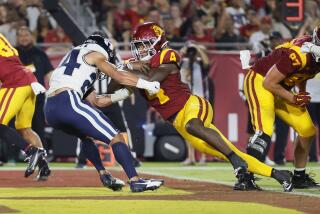Gridiron gasbags
- Share via
There’s something cute about political pundits when they’re wrong. Sure, they have perks indicating that their opinions matter more than ours -- a camera, an audience, perhaps even a column -- but at the end of the day, they get the same humble vote we do (electoral college distortions aside). Ultimately, what the Ivy League suits say on Fox News means no more than the mumblings of the beer-guzzling former high school football players watching them. God bless America.
But what if that weren’t the case? What if those talking heads -- so self-assured and assertive in their opinions and predictions -- had a much bigger say, or in fact the only say, in determining the pecking order they punditize about? Even if in many cases their observations turn out to be wrong?
You needn’t stretch your imagination much to find such an example -- but in sports, not politics.
God bless college football.
Aside from figure skating or gymnastics, it’s tough to think of a sport whose outcome is determined more by the opinions of so-called experts. And unlike said Olympic staples, football games have scores -- you know, the aggregation of each team’s respective points to determine which has performed better in the contest. You’d think an empirically useful tool such as numbers would negate the relevance of expert opinions.
But in college football, the “outcome” isn’t only a game score -- it’s how well you’re perceived by a handful of coaches, sports journalists and other gridiron oracles. Each Sunday during the season, these people anoint the country’s top 25 teams -- many of which will never face each other in a game -- in three separate polls. Clawing up those polls is the ultimate goal in college football; winning games helps, but it’s not always enough.
This pageantry has spawned a curious industry in which each Saturday’s games are merely the sideshow. In the week leading up to game day, sportswriters and commentators spill plenty of print and digital ink writing columns that ponder the significance of upcoming matches, sometimes even predicting the games’ outcome down to the score.
Here’s where I should confess a bias -- UC Berkeley, my alma mater, fields the third-ranked California Golden Bears football squad (heretofore known as Cal). In late 2004, the Bears looked headed to their first Rose Bowl game since 1959 and were practically assured that if they won their final game -- a make-up match in Mississippi during the school week -- they’d square off in the New Year’s classic in Pasadena. The Bears won handily, yet ended up at a lesser bowl game thanks to a few coaches and football pundits who suddenly decided that Texas was more deserving of a trip to Pasadena.
It was the hype surrounding a Cal game against a resurgent University of Oregon football squad this past Saturday that made me pay special attention to the buzz leading up to the week’s matches. To my dismay, Cal was widely picked to lose and -- almost right up to the game’s televised kick-off on ABC -- pundits predicted that the match-up between these two high-scoring teams would resemble a “track meet,” chock full of dazzling offensive plays. With all the gridiron wisdom, why even play?
Oops. Cal ended up the victors in a game that was lowest-scoring effort of the season for either team (31-24). So much for the track meet. Elsewhere in the country, last week ended up with five of the top 10 teams being upset by lesser-ranked foes. Of course, by “upset,” I mean going against the widespread expectations of college football pundits.
So the experts went back to their polling, rearranged their lists of the top 25 teams, and spent several days analyzing how the previous week’s upsets exposed the losing teams’ long-festering weaknesses. Saturday had been such a monumental day of upsets that gridiron guru Stewart Mandel (whose own predictions had been wildly off the mark) proposed a three-tiered system to, um, rank the unexpectedness of upsets.
The more sensible explanation is that most college football pundits were just plain wrong, and that the sport relies too heavily on their perception of teams’ strength at the expense of whether a squad actually wins or loses. In a way, you could argue that the experts performed just as poorly as last Saturday’s top-ranked teams.
But, unlike the suits who speculate on Washington politics and can be wrong without consequence, the gridiron gasbags hold the keys to the college football rankings, some of which determine the most important match-ups in postseason bowl games.
A job where you can be self-assured, loud, wrong and yet still matter -- no wonder Rush Limbaugh tried to get a job in sports broadcasting.
Paul Thornton is a researcher for The Times’ editorial page; click to read more of his Opinion Daily columns. Send us your thoughts at opinion@latimes.com.
More to Read
A cure for the common opinion
Get thought-provoking perspectives with our weekly newsletter.
You may occasionally receive promotional content from the Los Angeles Times.










